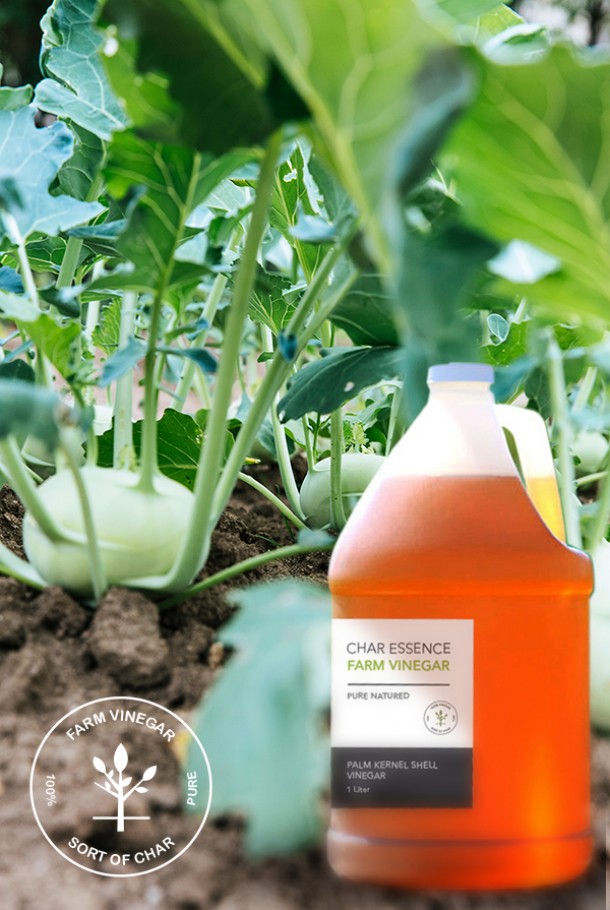What is Wood Vinegar?
Wood Vinegar, also known as Pyroligneous Acid, is a liquid co-product of the biochar production process. Wood vinegar is made up of a variety of different minerals, compounds, and acids. Researchers have found that wood vinegar contains over 200 different ingredients, and it has been used for decades throughout Asia with beneficial effects in agricultural applications.

Uses of Wood Vinegar
Researchers have found that the beneficial effects of wood vinegar in agricultural applications include:
- Spraying diluted wood vinegar on plant leaves increases their vitality and improves crop quality.
- Spraying also helps control harmful insects and some kinds of plant diseases.
- Wood vinegar and agricultural chemicals are complementary. The efficacy of using them together is greater than using either one alone.
- If wood vinegar is applied to the soil or mixed into it in high concentrations, it inhibits eelworms and soil diseases. In low concentrations or while it is in the process of being broken down in the soil it increases the quantity of useful microbes.
- Wood vinegar helps plants develop stronger roots.
- Mixing wood vinegar with manure reduces odours and facilitates composting.
Application Rates
The Appropriate Technology Association of Thailand recommends the following wood vinegar/water solution rates for various farm uses (ATA, p. 27-28). Note that, in some cases, no details were given regarding the specific identity of pests:
- Repel nematodes - Tomatoes, 1:500 (apply to the base of plants); strawberries, 1:200 (apply to the base of plants); and black pepper vines, 1:1500 (apply in place of water).
- Repel insect pests - Cabbage and Chinese cabbage, 1:1500 (apply in place of water); corn 1:300 (spray onto leaves).
- Control of fungal diseases - Tomato and cucumber, 1:200 (spray onto leaves).
- Control of root rot - Tomato and cucumber, 1:200 (apply to the base of plants).
- Reduce incidence of chili pepper flowers aborting 1:300 (spray onto leaves).
- Improve flavor of sweet fruits and stimulate development of crops. Mix solution rates of 1:500 to 1:1000. Wood vinegar prevents excessive nitrogen levels, improves plant metabolism and contributes to higher fruit sugar levels.
- Stimulate compost production. A solution rate of 1:100 will help increase the biological activity of various beneficial microbes and can decrease composting times.
- Combat bad odor. A wood vinegar solution of 1:50 will diminish the production of odor-causing ammonia in animal pens.
- Supplement for livestock feed. Mixed with livestock feed at rates of between 1:200 and 1:300, wood vinegar can adjust bacterial levels in the animal digestive tract which improves the absorption of nutrients from feed.
- Enrich garden soil. Use a strong solution of 1:30 to apply to the garden soil surface at a rate of 6 liters of solution per 1m² to enrich the soil prior to planting crops. To control soil-based plant pathogens, use an even stronger rate of 1:5 to 1:10.
- Repel house flies. Dilute wood vinegar at a rate of 1:100 and apply to affected areas.
